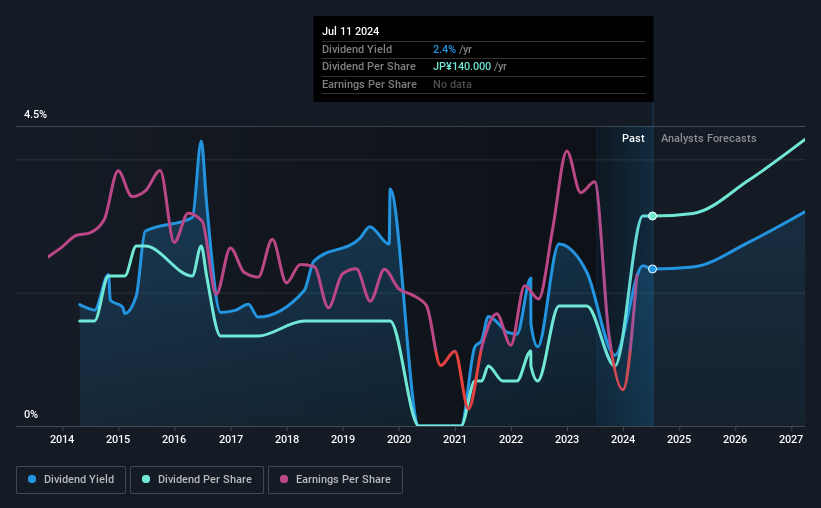Kawasaki Heavy Industries' (TSE:7012) Shareholders Will Receive A Bigger Dividend Than Last Year

Kawasaki Heavy Industries, Ltd. (TSE:7012) has announced that it will be increasing its dividend from last year's comparable payment on the 4th of December to ¥70.00. Based on this payment, the dividend yield for the company will be 2.4%, which is fairly typical for the industry.
See our latest analysis for Kawasaki Heavy Industries
Kawasaki Heavy Industries' Earnings Easily Cover The Distributions
While it is always good to see a solid dividend yield, we should also consider whether the payment is feasible. Kawasaki Heavy Industries is quite easily earning enough to cover the dividend, however it is being let down by weak cash flows. In general, we consider cash flow to be more important than earnings, so we would be cautious about relying on the sustainability of this dividend.
The next year is set to see EPS grow by 22.5%. If the dividend continues on this path, the payout ratio could be 51% by next year, which we think can be pretty sustainable going forward.

Dividend Volatility
Although the company has a long dividend history, it has been cut at least once in the last 10 years. The dividend has gone from an annual total of ¥70.00 in 2014 to the most recent total annual payment of ¥140.00. This implies that the company grew its distributions at a yearly rate of about 7.2% over that duration. A reasonable rate of dividend growth is good to see, but we're wary that the dividend history is not as solid as we'd like, having been cut at least once.
Dividend Growth May Be Hard To Achieve
With a relatively unstable dividend, it's even more important to see if earnings per share is growing. Unfortunately, Kawasaki Heavy Industries' earnings per share has been essentially flat over the past five years, which means the dividend may not be increased each year.
Kawasaki Heavy Industries' Dividend Doesn't Look Sustainable
Overall, this is probably not a great income stock, even though the dividend is being raised at the moment. While Kawasaki Heavy Industries is earning enough to cover the payments, the cash flows are lacking. We would be a touch cautious of relying on this stock primarily for the dividend income.
Market movements attest to how highly valued a consistent dividend policy is compared to one which is more unpredictable. However, there are other things to consider for investors when analysing stock performance. Case in point: We've spotted 4 warning signs for Kawasaki Heavy Industries (of which 1 is a bit concerning!) you should know about. Is Kawasaki Heavy Industries not quite the opportunity you were looking for? Why not check out our selection of top dividend stocks.
Valuation is complex, but we're here to simplify it.
Discover if Kawasaki Heavy Industries might be undervalued or overvalued with our detailed analysis, featuring fair value estimates, potential risks, dividends, insider trades, and its financial condition.
Access Free AnalysisHave feedback on this article? Concerned about the content? Get in touch with us directly. Alternatively, email editorial-team (at) simplywallst.com.
This article by Simply Wall St is general in nature. We provide commentary based on historical data and analyst forecasts only using an unbiased methodology and our articles are not intended to be financial advice. It does not constitute a recommendation to buy or sell any stock, and does not take account of your objectives, or your financial situation. We aim to bring you long-term focused analysis driven by fundamental data. Note that our analysis may not factor in the latest price-sensitive company announcements or qualitative material. Simply Wall St has no position in any stocks mentioned.
Have feedback on this article? Concerned about the content? Get in touch with us directly. Alternatively, email editorial-team@simplywallst.com
About TSE:7012
Kawasaki Heavy Industries
Engages in aerospace systems, energy solution and marine engineering, precision machinery and robot, rolling stock, and motorcycle and engine businesses in Japan and internationally.
Solid track record with moderate growth potential.
Similar Companies
Market Insights
Community Narratives



